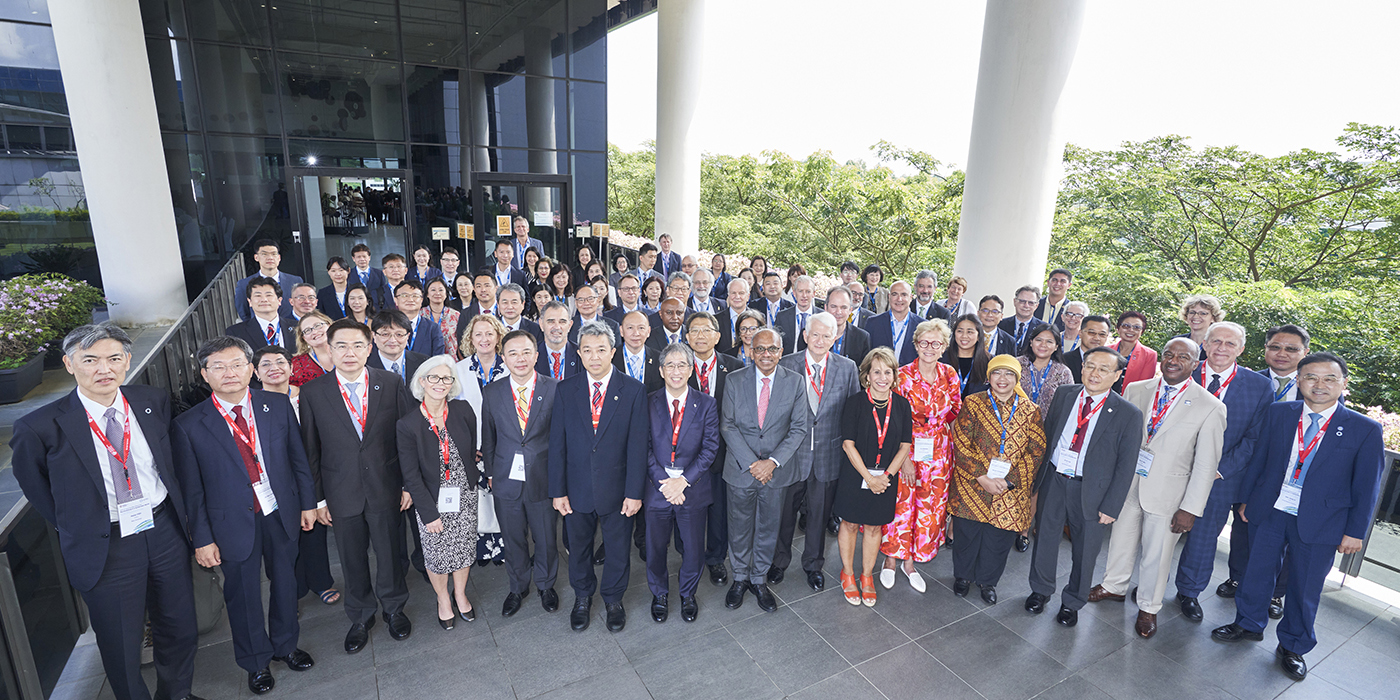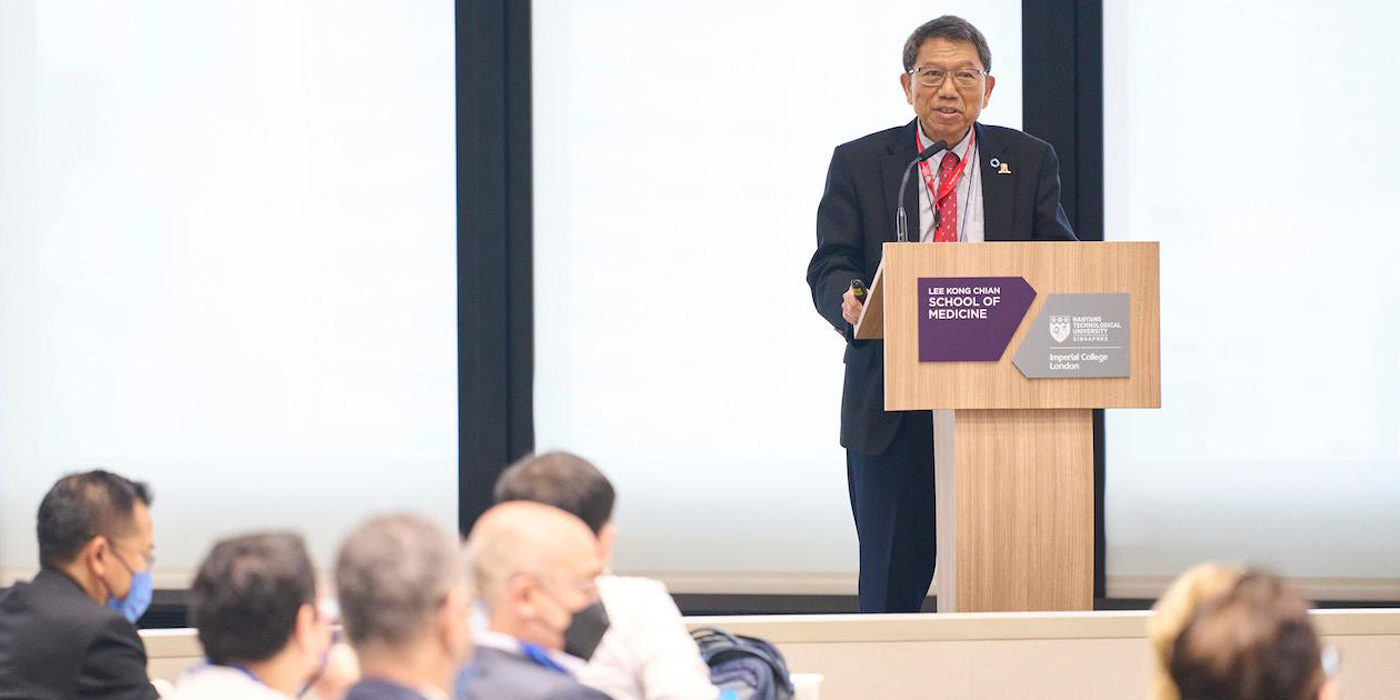
Welcome to the fifth edition of CUHK in Focus.
I am writing this from overseas where I have just participated as Vice Chair in the Annual Presidents’ Meeting of the Association of Pacific Rim Universities (APRU) hosted by the Nanyang Technological University in Singapore.
It was APRU’s first face-to-face meeting since 2019, and it was thrilling to join over 100 university presidents, university delegates and higher education leaders for a three-day event focused on the topical theme of “Reconnecting in a Sustainable World”. Delegates considered and discussed a range of issues that included sustainability, the climate change crisis, how to prepare for the next pandemic, and the urgent need to collaborate as we begin transitioning out of the COVID-19 pandemic.
I was especially glad to join Professor Bundhit Eua-arporn, President of Chulalongkorn University, to launch APRU’s SDG4GC Programme to increase awareness of global issues among students. This initiative is an extension of our globally acclaimed APRU Virtual Student Exchange Programme (also hosted by CUHK), and will see the network partner with Kyushu University, Shanghai Jiao Tong University, Simon Fraser University, the University of Malaya, and the United Nations to develop a new approach to building student awareness of the Sustainable Development Goals and global issues more broadly.

I also gave an update on the important work being undertaken by the APRU Presidential Working Group on Preparing for the Next Pandemic which I am co-chairing a sub-group with Professor Santa Ono, President of the University of British Colombia. This work aims to combine the resources of universities from across the Pacific Rim to provide recommendations to leaders at the Asia Pacific Economic Cooperation (APEC) Forum meeting in Thailand later this year. Our report spans issues including cataloguing and connecting fundamental and translational research across the network, battling the “infodemic” and the proliferation of misinformation, and I am specifically focused on the importance of social and cultural determinants in the response to public health measures.

To connect with colleagues from around the world in-person after so long was truly delightful and gratifying. While video technologies, such as Zoom, have sustained our collaborations and interactions with the world throughout the pandemic, face-to-face interactions are irreplaceable as they provide the side conversations, networking, and in-depth exchanges that are absolutely crucial for the establishment and consolidation of partnerships and collaborations.
Positive reports are suggesting that it won’t be too long that Hong Kong will be able to host more international visitors, and that it will soon be easier for us to travel internationally and connect with colleagues.
Next year’s APRU meeting is due to be held in Hong Kong, and it will come just a week after CUHK hosts the Times Higher Education Asia Universities Summit in June. These face-to-face interactions will coincide with our 60th anniversary celebrations next year meaning we will have even more to look forward to.
CUHK lands in the Yangtze River Delta
Another exciting piece of news to share is the recent signing of the agreement between the Yangpu District Government and CUHK, marking the establishment of our new CUHK Shanghai Centre. This new initiative, which we have been pursuing for the past two years, enables CUHK to establish a physical presence in the Yangtze River Delta to promote exchanges between alumni, entrepreneurs, scholars and students from Shanghai (and beyond) and Hong Kong. Shanghai is a leading global metropolis with an internationally recognised higher education and research system. Many of the 250,000 CUHK alumni are also located in this part of the country. The Shanghai Centre follows the spirit of the CUHK Shenzhen Research Institute, which was established 15 years ago, and today is home to 60 startups founded by CUHK alumni. While the space in Shanghai is much smaller than its Shenzhen counterpart, we hope that over time it will grow and provide space for startups and our alumni, who can count on the support of CUHK as they go through their entrepreneurship journey.
CUHK has longstanding partnerships with major universities in Shanghai, including Fudan University and Shanghai Jiao Tong University, and we have existing joint research via collaborations, such as the CUHK – Fudan University Research Centre in Life and Biomedical Sciences, and the Shanghai Artificial Intelligence Laboratory in partnership with the publicly listed company, SenseTime, which many of you will know was founded by four CUHK professors. The CUHK Shanghai Centre will give us a physical presence and further strengthen these important partnerships.

Major success in the RGC 2022/23 grants scheme
My congratulations to all successful colleagues in the recent Research Grants Council (RGC) 2022/23 grants scheme where 265 CUHK projects will receive over $200 million in funding via the RGC’s General Research Fund (GRF) and Early Career Scheme (ECS).
We did particularly well in the ECS with CUHK receiving the highest share across the eight UGC-funded universities. This funding success of our cohort of early career researchers will provide a strong foundation for some of our youngest and brightest to advance their careers.
Under the RGC’s Theme-based Research Scheme (TRS), a research team led by Professor Pheng Ann Heng in the Department of Computer Science & Engineering has secured a grant of more than $50 million to establish a new Institute of Medical Intelligence and Extended Reality, which is set to revolutionise artificial intelligence and extended reality technology in healthcare solutions.
Yours sincerely,
Professor Rocky S. Tuan
Vice-Chancellor and President
The Chinese University of Hong Kong